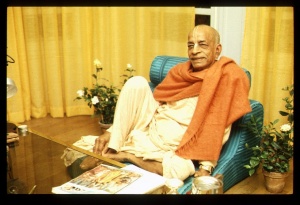CC Madhya 8.300 (1975): Difference between revisions
(Vanibot #0027: CCMirror - Mirror CC's 1996 edition to form a basis for 1975) |
(Vanibot #0020: VersionCompareLinker - added a link to the Version Compare feature) |
||
| Line 2: | Line 2: | ||
<div style="float:left">'''[[Sri Caitanya-caritamrta (1975)|Śrī Caitanya-caritāmṛta (1975)]] - [[CC Madhya (1975)|Madhya-līlā]] - [[CC Madhya 8 (1975)|Chapter 8: Talks Between Śrī Caitanya Mahāprabhu and Rāmānanda Rāya]]'''</div> | <div style="float:left">'''[[Sri Caitanya-caritamrta (1975)|Śrī Caitanya-caritāmṛta (1975)]] - [[CC Madhya (1975)|Madhya-līlā]] - [[CC Madhya 8 (1975)|Chapter 8: Talks Between Śrī Caitanya Mahāprabhu and Rāmānanda Rāya]]'''</div> | ||
<div style="float:right">[[File:Go-previous.png|link=CC Madhya 8.299 (1975)|Madhya-līlā 8.299]] '''[[CC Madhya 8.299 (1975)|Madhya-līlā 8.299]] - [[CC Madhya 8.301 (1975)|Madhya-līlā 8.301]]''' [[File:Go-next.png|link=CC Madhya 8.301 (1975)|Madhya-līlā 8.301]]</div> | <div style="float:right">[[File:Go-previous.png|link=CC Madhya 8.299 (1975)|Madhya-līlā 8.299]] '''[[CC Madhya 8.299 (1975)|Madhya-līlā 8.299]] - [[CC Madhya 8.301 (1975)|Madhya-līlā 8.301]]''' [[File:Go-next.png|link=CC Madhya 8.301 (1975)|Madhya-līlā 8.301]]</div> | ||
{{CompareVersions|CC|Madhya 8.300|CC 1975|CC 1996}} | |||
{{RandomImage}} | {{RandomImage}} | ||
==== TEXT 300 ==== | ==== TEXT 300 ==== | ||
<div class="verse"> | <div class="verse"> | ||
:prātaḥ-kāle | :prātaḥ-kāle uṭhi' prabhu dekhi' hanumān | ||
:tāṅre | :tāṅre namaskari' prabhu dakṣiṇe karilā prayāṇa | ||
</div> | </div> | ||
| Line 18: | Line 17: | ||
<div class="synonyms"> | <div class="synonyms"> | ||
prātaḥ-kāle—in the morning; | prātaḥ-kāle—in the morning; uṭhi'-rising; prabhu—Lord Śrī Caitanya Mahāprabhu; dekhi'-visiting; hanumān—the village deity Hanumān; tāṅre—unto him; namaskari'-offering obeisances; prabhu—Śrī Caitanya Mahāprabhu; dakṣiṇe—to the south; karilā—made; prayāṇa—departure. | ||
</div> | </div> | ||
| Line 32: | Line 31: | ||
<div class="purport"> | <div class="purport"> | ||
In almost all the cities and towns of India there are temples of Hanumānjī, the eternal servant of Lord Rāmacandra. There is even a temple of Hanumān near Govindajī temple in Vṛndāvana. Formerly this temple was in front of the Gopālajī temple, but | In almost all the cities and towns of India there are temples of Hanumānjī, the eternal servant of Lord Rāmacandra. There is even a temple of Hanumān near Govindajī temple in Vṛndāvana. Formerly this temple was in front of the Gopālajī temple, but that Deity Gopālajī went to Orissa to remain as Sākṣi-gopāla. Being the eternal servant of Lord Rāmacandra, Hanumānjī has been respectfully worshiped for many hundreds and thousands of years. Here even Lord Śrī Caitanya Mahāprabhu set the example in showing how one should offer respects to Hanumānjī. | ||
</div> | </div> | ||
Latest revision as of 20:14, 27 January 2020

A.C. Bhaktivedanta Swami Prabhupada
TEXT 300
- prātaḥ-kāle uṭhi' prabhu dekhi' hanumān
- tāṅre namaskari' prabhu dakṣiṇe karilā prayāṇa
SYNONYMS
prātaḥ-kāle—in the morning; uṭhi'-rising; prabhu—Lord Śrī Caitanya Mahāprabhu; dekhi'-visiting; hanumān—the village deity Hanumān; tāṅre—unto him; namaskari'-offering obeisances; prabhu—Śrī Caitanya Mahāprabhu; dakṣiṇe—to the south; karilā—made; prayāṇa—departure.
TRANSLATION
After rising from bed the next morning, Śrī Caitanya Mahāprabhu visited the local temple, where there was a deity of Hanumān. After offering him obeisances, the Lord departed for South India.
PURPORT
In almost all the cities and towns of India there are temples of Hanumānjī, the eternal servant of Lord Rāmacandra. There is even a temple of Hanumān near Govindajī temple in Vṛndāvana. Formerly this temple was in front of the Gopālajī temple, but that Deity Gopālajī went to Orissa to remain as Sākṣi-gopāla. Being the eternal servant of Lord Rāmacandra, Hanumānjī has been respectfully worshiped for many hundreds and thousands of years. Here even Lord Śrī Caitanya Mahāprabhu set the example in showing how one should offer respects to Hanumānjī.